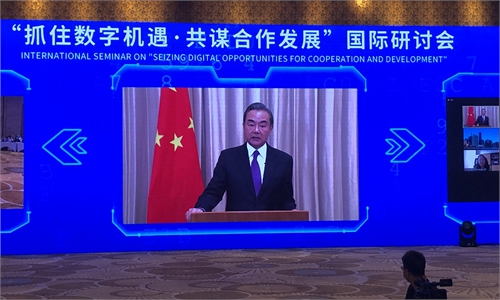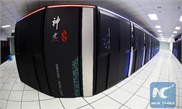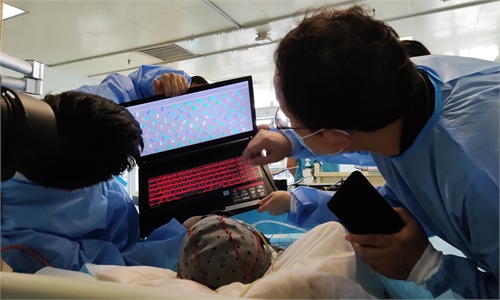A model of Origin Wukong, China's independently developed third-generation superconducting quantum computer Photo: VCG
China's quantum computing industry has made new progress. Recently, Chinese startup Origin Quantum in Hefei, East China's Anhui Province, launched Origin Tianji 4.0, a self-developed superconducting quantum measurement and control system that supports 500-plus-qubit quantum computers. The progress indicates that China's quantum computing industry has achieved replicable and iterative engineering production capabilities, laying the foundation for the mass production of hundred-bit quantum computers, Kong Weicheng, head of the system's development team, told the Global Times.
Dubbed the "nerve centers" of quantum computers, measurement and control systems manage precise signal generation, acquisition, and control for quantum chips. In 2018, Kong's team developed the first domestically produced quantum computer control system with completely independent intellectual property rights, filling a gap in the domestic quantum computing measurement and control field.
The latest Origin Tianji 4.0 system can effectively shorten the development and delivery time for quantum computers at the hundred-bit scale, while enhancing the system's automation capabilities and long-term stability, according to Kong, who is also deputy director of Anhui Quantum Computing Engineering Research Center.
Previously, China relied heavily on imports for high-end instruments and equipment, and we could only use traditional commercial instruments to build our quantum computing measurement and control systems, with signal output and acquisition tasks being conducted separately. This approach was not only costly and redundant in functionality, but also had drawbacks such as poor compatibility and difficulty in integration, Kong told the Global Times.
"Now, after multiple iterations, China's quantum computing measurement and control system has improved in terms of product scalability, integration, performance stability, and automation level. What we need to do is to go from nothing to something, and from something to a usable and durable product," Kong said.
The Origin Tianjin 4.0 system was built and upgraded based on its preceding 3.0 version, which powers Origin Wukong, China's independently developed third-generation superconducting quantum computer.
Since it went into operation on January 6, 2024, Origin Wukong has served users in 139 countries and regions over 26 million times, and completed more than 380,000 quantum computing tasks, covering a wide range of industries from finance to biomedicine, the Global Times learned from the team.
According to Kong, in recent years, the process of quantum computing industrialization has been growing rapidly around the world. Eight years ago, Barclays Bank began to explore the application scenarios of quantum technology in the financial sector. Subsequently, leading international financial institutions such as JPMorgan Chase and Goldman Sachs formed quantum research teams to explore quantum computing applications.
Domestically, quantum computing has been explored in various industries, including national defense and security, biopharmaceuticals, energy materials, artificial intelligence, financial markets, and transportation and aviation. However, "there is still a significant gap from the industry's expectations for exponential acceleration and leaps in computing power," Kong said.
According to Kong, the development of quantum computers is influenced by various factors such as hardware devices, cooling environments, and temperature, and these challenges require cross-disciplinary collaboration, including efforts in ecological construction and other dimensions. - Global Times In Depth





























